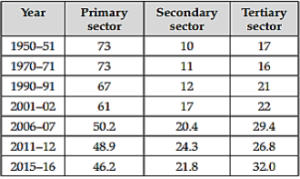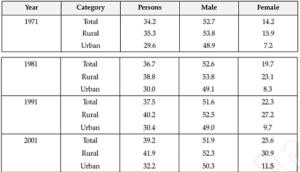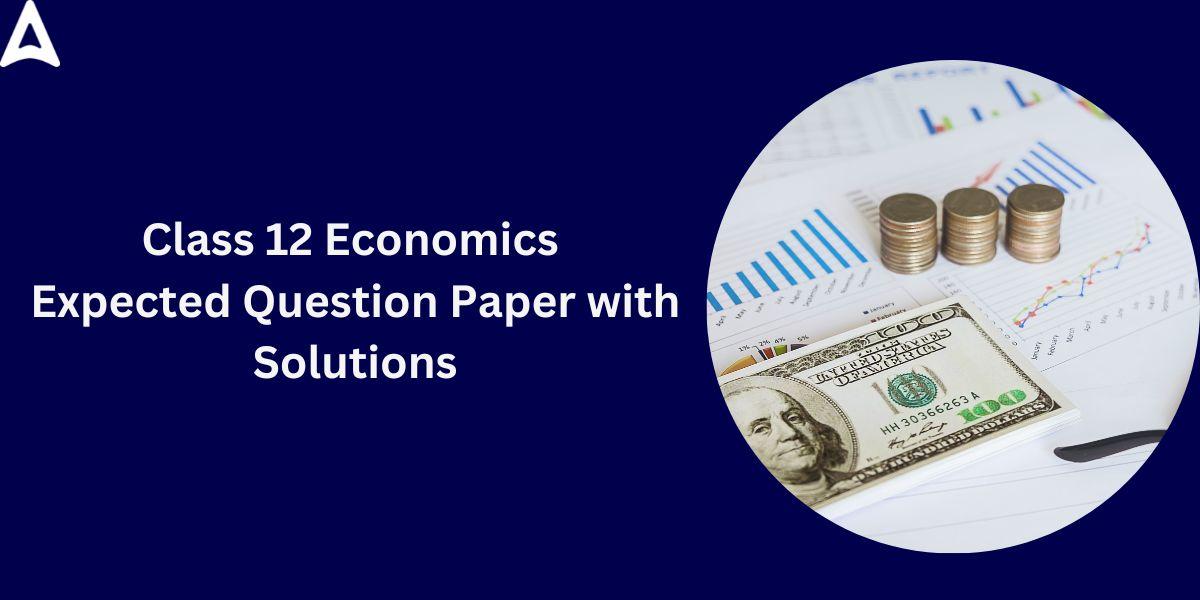Table of Contents
With the impending Class 12 Economics board exam 2024, students naturally want to solve the concepts hidden in the question paper. Although it is impossible to anticipate the future, one can traverse the political terrain of the exam by looking at past patterns and recent trends. The experts in the Economics exam field can guess the expected board exam paper more easily in this regard.
Following this, our Economics experts at Adda247 with years of teaching experience have created the expected Economics Board Exam Paper 2024. The expected Economics board exam paper 2024 given in this article will help students understand the latest types of questions based on the recently revised curriculum. Students will be able to increase their scores by solving the expected board exam paper given below and analyzing their answers.
Class 12 Economics Board Paper 2024
Expected Class 12 Economics Board Paper 2024: The CBSE Class 12 Economics Examination will be held on March 18, 2024. Thus it is imperative that we maximize our Class 12 Economics exam performance right now. In order to be ready to respond to questions in the exam room on the exam day, students should practice as much as they can using the Sample Class 12 Economics Board Paper 2024.
For the convenience of class 12 candidates, our Adda247 Expert faculty prepares the Expected Class 12 Economics Board Paper 2024, which is based on the proper CBSE Class 12 Exam pattern. Those who intend to take the Class 12 Economics Board Examination in 2024 must take the Expected Class 12 Economics Board Paper 2024 and match their answers with the solution key given here.
Class 12 Economics Board Paper 2024 Pattern
Class 12 Economics Board Paper 2024 is divided into two sections. Class 12 Economics Board Paper 2024 includes
- Section A – Macroeconomics
- Section B -Indian Economic Development
Class 12 Economics Board Paper 2024 has
- 20 Multiple Choice Questions (MCQs) for one mark each.
- Four 3-mark Quick Answer Questions that must be answered in 60 to 80 words.
- 6 Short Answer Questions of 4 marks each, to be answered in 80 to 100 words.
- Four Long Answer Questions of 6 marks each, to be answered in 100 to 150 words.
Class 12 Economics Question Paper 2024 Section A
Section – A
1. Credit creation by commercial banks is determined by
(a) Cash Reserve Ratio (CRR)
(b) Statutory Liquidity Ratio (SLR)
(c) Initial deposits
(d) All of these
Answer: (d) All of these
2. Choose the correct statement from given below.
(a) Balance of trade records the exports and imports of invisible items.
(b) A surplus in BoT can rectify the deficit in BoP.
(c) Accommodating items are only recorded in capital account of BoP.
(d) Import of machinery will be recorded in capital account of BoP.
Answer: (c)
3. Statement I According to the theory of Keynesian Economics, the value of the Average Propensity to Consume (APC) can never be zero.
Statement II The Keynesian Aggregate Supply is perfectly elastic before the level of full employment is attained.
In the light of the given statements, choose the correct alternative from the following
(a) Statement I is true and Statement II is false
(b) Statement I is false and Statement II is true
(c) Both statements are true
(d) Both statements are false
Answer: (c)
4. Identify the correctly matched pair in Column A (Government Institutions) and Column B (Date of Establishment) from the following:
| Column 1 | Column 2 |
| A. NABARD | (i) 1950 |
| B. RBI | (ii) 1955 |
| C. National Development Council | (iii) 1952 |
| D. IDBI | (iv) 1980 |
(a) (a) – (i)
(b) (b) – (ii)
(c) (c) – (iii)
(d) (d) – (iv)
Ans. (b)
5. Identify the correctly matched pair of the items in column A to those in column B:
| Column 1 | Column 2 |
| A. Money flow | (i) Depreciation |
| B. Real flow | (ii) Factor services |
| C. Trade flow | (iii)Consumption expenditure |
| D. Capital flow | (iv)Inventory |
Alternative
(a) (a) – (i)
(b) (b) – (ii)
(c) (c) – (iii)
(d) (d) – (iv)
Ans. (b)
6. Read the following statements carefully:
Statement 1: The consumption curve is an upward sloping straight line curve due to the direct relationship between income and consumption and the assumption of constant Marginal Propensity to Consume.
Statement 2: Aggregate Demand curve and Consumption curve are parallel to each other.
In the light of the given statements, choose the correct alternative from the following:
(a) Statement 1 is true and statement 2 is false.
(b) Statement 1 is false and statement 2 is true.
(c) Both statements 1 and 2 are true.
(d) Both statements 1 and 2 are false
Ans. (c)
7. Statement I Expected obsolescence is included in depreciation.
Statement II Fall in the market value of assets during the period of economic downturn is an example of \depreciation.
In the light of the given statements, choose the correct alternative from the following
(a) Statement I is true and Statement II is false
(b) Statement I is false and Statement II is true
(c) Both statements are true
(d) Both statements are false
Ans. (a)
8. In an economy, the saving functions are given as S=-100+ 0.2 y The equilibrium level of income will be
(a)1,000
(b) 500
(c) 700
(d) 600
Ans. (b)
9. Which of the following is correct?
(a) APC = Y
(b) MPC = 1-MPS
(c) APC+APS = 1
(d) All of these
Ans. (d)
10. Which of the following gives a correct definition of the term ‘near money”?
(a) Asset which has 100% liquidity.
(b) Asset which has no store of value function.
(c) Asset which is a medium of exchange.
(d) Asset which fulfils the store of value function and can be converted into a medium of exchange at a short notice.
Ans. (d)
11. Find NVA at Market price
| Items | ₹ in Lakh |
| Depreciation | 6 |
| Raw material | 12 |
| Sales | 50 |
| Net change in stock | -4 |
| Taxes on product | 2 |
Answer: Calculate Gross value added at MP
GVAmp = sales + change in stock – Intermediate consumption
GVAmp = 50 + (- 4) – 12
GVAmp = 36 Lakh
Calculate NVA at MP
NVAmp = GVAmp – Depreciation
NVAmp = 36 – 6
NVAmp = 30 lakh
16. From the following data, calculate the value of compensation of employees (COE):
| Items | Amount in crore |
| Old age pension | 2,000 |
| Wages and salary in cash | 60,000 |
| Rent free accommodation | 30,000 |
| Employer’s contribution to PF | 7,500 |
| Payment of LIC by employees | 2,500 |
| Contribution to pf by employees | 35,000 |
Answer:
Calculate the companion of employees
COE = wages and salary in cash + Rent free accommodation + Employer contribution
COE = 60000 +30000 +7500
COE = 97500 Cr
(17) Distinguish between stock and flow variables.
Class 12 Economics Question Paper 2024 Section B
Section B
18. First Industrial Policy was declared in 1956. [1]
(a) The statement is true.
(b) The statement is false as First Industrial Policy was declared in 1947.
(c) The statement is false as First Industrial Policy was declared in 1959.
(d) None of the above.
Ans. (b)
19. Read the following statements 1 and 2 and choose the correct alternatives:[1]
Statement 1: GST is game-changing reform for the Indian Economy.
Statement 2: GST has removed the cascading effect of taxes
(a) Both statements are true.
(b) Both statements are false.
(c) Only statement 1 is true.
(d) Only statement 2 is true.
Ans. (a)
20. Read the following statements – Assertion (A) and Reason (R). Choose one of the correct alternatives given below:
Assertion (A): All before demonetisation has occurred in the context of hyperinflation, wars, political upheavals or other extreme circumstances. Reason (R): Discontinuing the big notes boosted the economy.
Alternatives:
(a) Both Assertion (A) and Reason (R) are true and Reason (R) is the correct explanation of Assertion (A).
(b) Both Assertion (A) and Reason (R) are true and Reason (R) is not the correct explanation of Assertion (A).
(c) Assertion (A) is true but Reason (R) is false.
(d) Assertion (A) is false but Reason (R) is true.
Ans. (a)
21. Read the following statements – Assertion (A) and Reason (R). Choose one of the correct alternatives given below:
Assertion (A) : The first ten five-year plans gave importance to self-reliance. Reason (R) : Plan should have some clearly specified goals.
Alternatives:
(a) Both Assertion (A) and Reason (R) are true and Reason (R) is the correct explanation of Assertion (A).
(b) Both Assertion (A) and Reason (R) are true and Reason (R) is not the correct explanation of Assertion (A).
(c) Assertion (A) is true but Reason (R) is false.
(d) Assertion (A) is false but Reason (R) is true.
Ans. (a)
22. What does Green Revolution imply?
(a) Decrease in production of food grains
(b) Increase in production of food grains
(c) Increase in green cover
(d) Decrease in green cover
Ans. (b)
23. Read the following statements -Assertion (A) and Reason(R), Choose one of the correct alternatives given below:
Assertion (A): The goal of equity was fully served by abolition of intermediaries.
Reason (R): The growth of the country can lead to income inequality and with more modernization unemployment will increase leading to people living under poverty line.
Alternatives:
(a) Both Assertion (A) and Reason (R) is true and Reason (R) is the correct explanation of Assertion (A)
(b) Both Assertion (A) and Reason (R) is true, but Reason (R) is not the correct explanation of Assertion (A).
(c) Assertion (A) is true, but Reason (R) is false.
(d) Assertion (A) is false, but Reason (R) is true
Ans. (d)
S27. Ans. (a)
24. The kind of unemployment in which workers seems to be working but its contribution to production is negligible is called:
(a) Seasonal unemployment
(b) Disguised unemployment
(c) Industrial unemployment
(d) Educated unemployment
Ans. (b)
25. The production process engaged in transforming one good to another is known as:
(a) Primary sector
(b) Secondary sector
(c) Tertiary sector
(d) None
Ans. (b)
26. Name the active factor in production.
(a) Land
(b) Physical Capital
(c) Human Capital
(d) None of the above
Ans. (c)
27. What is an economic plan?
(a) A plan is how the nation’s resources can be used having some general goals and achieving specific objectives within a specified period.
(b) A plan is a blueprint for infrastructure development.
(c) A plan is the government budget.
(d) A plan is the allocation of resources.
Ans. (a)
8. How is human development a broader term as compared to human capital[3]
or,
‘Sustainable development is a paradigm shift in development thinking’. Comment. [3]
29. Why are children not included in working population? [3]
30. “Foreign exchange crisis was the basis of economic policies of liberalisation, privatisation and globalisation.” Justify. [4]
OR
Why should plans have goals?
31. Why did India adopt New Economic Policy in 1991
32. “During colonial period, India was a semi-feudal economy.” Justify. [4]
OR
State the trend in the contribution of different sectors in India’s total employment. [4]

33. Looking at the trend given in the table what can we say about the women workforce participation in rural and urban areas? Comment on why such a trend is there prevalent in the country.

34. Read the extract given below and answer the questions that follows: Indebtedness means an obligation to pay money to another party. In rural India the poor farmers and wage labours etc. when are unable to repay a loan and accumulate it, gives rise to the problem of rural indebtedness. Rural indebtedness is an indicator of the weak financial infrastructure of our country, which includes inability of our economic system to reach to the needy farmers, landless people in the villages and the agricultural wage labourers.
The farmers borrow loan for either agricultural operations or some other uses like supporting the family in the lean season or to buy equipment. Due to lower income or wasteful expenditures when the farmers are unable to pay the loans, they are unable to pay off their debts and thus accumulate the debt as well
as pending interest on the amount. The weaker ‘financial inclusion’ in India has given the local money lenders an opportunity to exploit such farmers from generations to generations. Royal Commission on Agriculture, 1928 The royal commission on Agriculture in India, 1928 was created in British India to
examine and report on the conditions of the farmers. It expressed: “The Indian peasant is born in debt, lives in debt and bequeaths the indebtedness to his successors. “
(a) After reading the above article write down the causes of rural in indebtedness in India? [3]
(b) Why has the regional rural banks not being able to cure rural indebtedness in India? [3]
Class 12 Board Economics Exam Paper- With Solutions
We also provide full solutions for the Class 12 Economics Board Exam Paper 2024. Students can examine their grades after completing the Anticipated Class 12 Economics board paper 2024.
| Class 12 Economics Expected Question Paper With Solutions Download |
Class 12 Economics Board Exam Sample Paper 2024 With Solutions
The solution video of the CBSE Class 12 Economics sample paper 2024 has been given below. Students must go through the sample paper 2024 solutions given below as these questions might appear in the actual board exam in 2024.






 Bihar Board 12th Result 2025 Out @ inter...
Bihar Board 12th Result 2025 Out @ inter...
 What Type of Questions are asked in CUET...
What Type of Questions are asked in CUET...
 CUET Arts Syllabus 2025 Out: Check CUET ...
CUET Arts Syllabus 2025 Out: Check CUET ...






